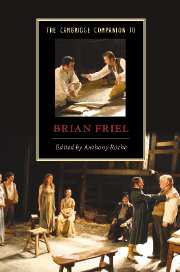Book contents
- Frontmatter
- 1 Introduction
- 2 The early plays
- 3 Surviving the 1960s: three plays by Brian Friel 1968-1971
- 4 Friel and the Northern Ireland “Troubles” play
- 5 Family affairs: Friel’s plays of the late 1970s
- 6 Five ways of looking at Faith Healer
- 7 Translations, the Field Day debate and the re-imagining of Irish identity
- 8 Dancing at Lughnasaand the unfinished revolution
- 9 The late plays
- 10 Friel’s Irish Russia
- 11 Friel and performance history
- 12 Friel’s dramaturgy: the visual dimension
- 13 Performativity, unruly bodies and gender in Brian Friel’s drama
- 14 Brian Friel as postcolonial playwright
- Bibliography
- Index
11 - Friel and performance history
Published online by Cambridge University Press: 28 January 2007
- Frontmatter
- 1 Introduction
- 2 The early plays
- 3 Surviving the 1960s: three plays by Brian Friel 1968-1971
- 4 Friel and the Northern Ireland “Troubles” play
- 5 Family affairs: Friel’s plays of the late 1970s
- 6 Five ways of looking at Faith Healer
- 7 Translations, the Field Day debate and the re-imagining of Irish identity
- 8 Dancing at Lughnasaand the unfinished revolution
- 9 The late plays
- 10 Friel’s Irish Russia
- 11 Friel and performance history
- 12 Friel’s dramaturgy: the visual dimension
- 13 Performativity, unruly bodies and gender in Brian Friel’s drama
- 14 Brian Friel as postcolonial playwright
- Bibliography
- Index
Summary
Any critic of performance history in relation to the works of Brian Friel has, inescapably, to confront the troublesome nature of the relationship between text and performance. The received wisdom among many actors and directors, shared more and more on drama courses in universities, is that the dramatist's text is a means to an end, that of live performance on a stage in the presence of a live audience - hence the multiplicity of courses with titles like “From Page to Stage,” and descriptions of play-texts in terms of “scripts,” “blueprints” or “scenarios.” The debates thus center on what is usually termed the realization of a text for theatrical purposes, often conveyed by obstetric analogy: the writer as parent, the text as fetus, the director as midwife, and the production in all of its aspects (acting, mise-en-scène, use of music, etc.) as baby. Mention of directors takes us straight to the plays of Brian Friel and the strength of his passion as to how artistic integrity may best be preserved in their realization. Over a period of thirty years or more, Friel has been consistently wary of directors and what he views as the inappropriate authority they enjoy in modern theatre.
- Type
- Chapter
- Information
- The Cambridge Companion to Brian Friel , pp. 117 - 128Publisher: Cambridge University PressPrint publication year: 2006
- 1
- Cited by

